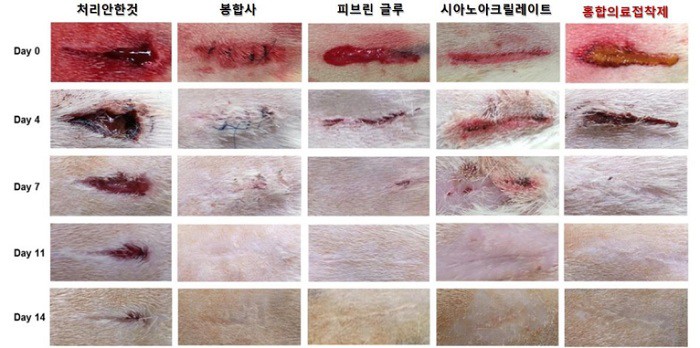Surgical thread and medical adhesives used to close wounds can now be replaced with a breakthrough adhesive made from mussel proteins.
A recent study has found that adhesives made from mussels are much more effective in suturing and in leaving fewer scars, compared to existing suturing methods.
According to a research team at the Ministry of Oceans and Fisheries, scientists have developed a new method of using recombinant adhesive proteins that mussels secrete when they stick to rocks underwater. The new “glue” shows more excellent adhesive strength and flexibility than existing surgical thread or suturing adhesives, and it causes fewer skin inflammations or scars, as well.

An experiment on wounded rats carried out by a research team at the Ministry of Oceans and Fisheries has found that wounds sealed more quickly and more effectively when an adhesive made from mussel proteins was applied, showing only little scarring (far right column). Existing surgical stitches and adhesives are shown toward the left.
The team conducted experiments on wounded rats and the results suggest that the new approach will be effective. In the experiment, scientists tried to seal the wounds using surgical thread, two existing medical adhesives — fibrin glue and cyanoacrylate — and, lastly, the new “glue” made from mussel proteins. In the results, the mussel “glue” wounds closed the fastest and left the smallest amount of scarring.
“The mussel ‘glue’ can be produced at a cost of less than KRW 200,000 per gram, and probably even at a cost of KRW 100,000 per gram when mass production becomes available,” said Cha Hyeong-jun, the leader of the research team. “We hope that this technology will be widely used in many fields, for example, to ‘glue’ biological tissues together. We also carried out experiments using it to stop or slow the blood flow from a wound.”
By Sohn JiAe
Korea.net Staff Writer
Photos: the Ministry of Oceans and Fisheries
jiae5853@korea.kr























